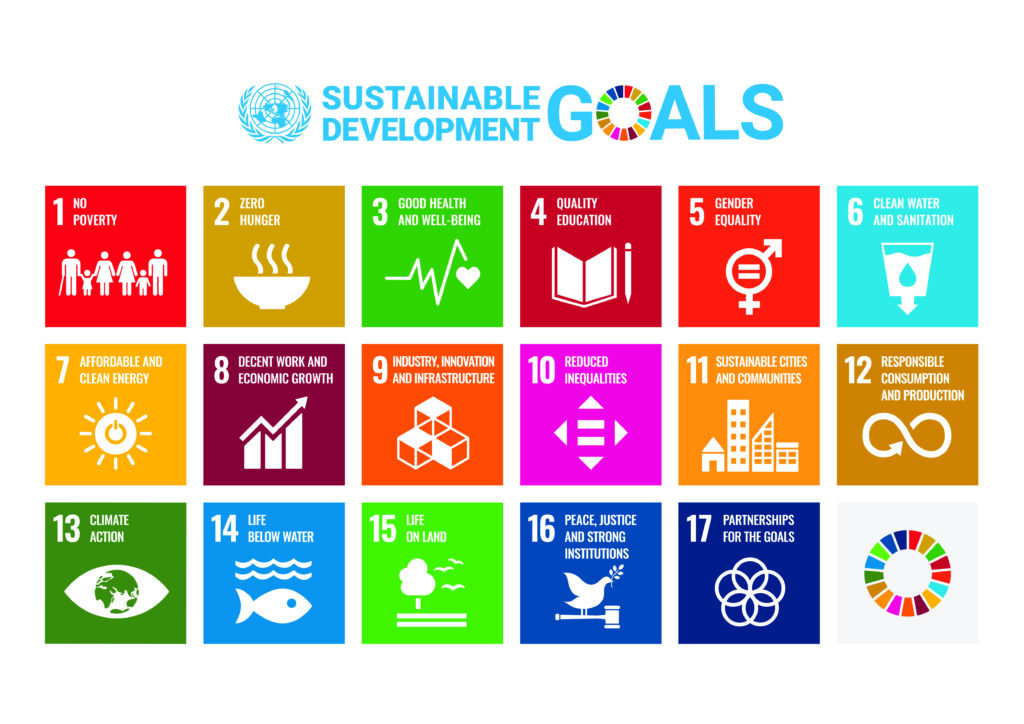QS MBA Fair – New Delhi
Thursday, July 18
8:30 AM
The mission of the Social Impact MBA closely aligns with the United Nations Sustainable Development Goals. Specifically, the aim of our program is to develop responsible leaders (of start-ups, established firms, and both for- and non-profit organizations) who create innovative products, services, and business models that help address vital social challenges — such as climate change, food security, global health, poverty, discrimination, etc. — and enable them to grow and sustain their organizations over time.

Questrom Social Impact MBA students are among the very best and brightest MBA students, nurturing a vibrant and inclusive learning community. Our students’ cultural and professional backgrounds, as well as their job aspirations, are very diverse. What unites them is a strong passion for creating positive change and showing leadership in tackling society’s most urgent environmental, economic, and social challenges.
We’ll connect you right away with alumni and other top professionals ready to support and guide you through our Social Impact MBA program. After you graduate, you’ll become part of our vibrant alumni network you can rely on throughout your career.

“Questrom is aiming to prepare those of us working in the for-profit world to think about the potential for socially responsible success in a whole new light.”
 View Profile
View Profile
 View Profile
View Profile
 View Profile
View Profile
 View Profile
View Profile
Full-Time Social Impact MBA
HEAD OF B2B, COME BIEN
In addition to the academic and extracurricular experiences that are available to all Full-Time MBA students, our Social Impact students also participate in student clubs, case competitions, and service activities that are specifically focused on social impact.
Every organization — be it government, private company or welfare agency — is in the business of changing behavior. In this course, students will learn to apply insights from behavioral economics to effectively produce it. In teams, students will: (1) translate a real-time business or policy challenge into a specific behavior change project; (2) use the frameworks presented in class along with research from economics, psychology, marketing, and other related disciplines to develop possible interventions and/or frameworks for addressing the challenge; and (3) audit the decision-making process of various stakeholders to identify pain points and opportunities for behavior change. Previous organizations include Warby Parker, the World Bank, and FCLT Global.
Link Day is a Questrom tradition everyone looks forward to. And one way we give back to the Greater Boston community. Link Day is a one-day consulting event that matches mission-driven organizations with teams of Questrom faculty and MBA students—including Social Impact students—to help solve business-related challenges for local nonprofits and social enterprises. Students gets hands-on practice. Organizations get new solutions and ideas. That’s what we call win-win!
How do organizations develop innovative products and services that act as sustainable solutions to social challenges? Students tackle these issues by doing a consulting project for a client from a host country and then present their recommendation to the client in person. Recent trips include South Africa and Brazil.
As a Social Impact MBA, you’ll have the chance to influence meaningful change during your internship with a leading company, startup, social enterprise, government, or nonprofit.
Social Impact MBA students are welcomed to get involved with Susilo Institute, a thought leader and platform for ethical business actions and responsible leadership with a global perspective. The Institute produces original research, offers courses, and hosts conference, guest speakers, and events for students, faculty, partner organizations, governments, alumni, and the public.
Social Impact MBA students are welcomed to get involved with the BU Institute for Global Sustainability, a university-wide center dedicated to developing energy systems that will provide abundant, universally accessible, and sustainable energy sources for emerging and advanced economies.
Whether you aspire to work in sustainable finance, impact investing, responsible for-profit business, or nonprofit and public management, Questrom’s Social Impact MBA program gives you the opportunity to gain crucial business skills that allow you to create positive social change. You will learn the full array of business fundamentals and—on top of that—you will be able to specialize in areas such as social entrepreneurship, sustainable energy and environment, global health, sustainable development, clean energy, impact investing, and public sector management. In addition to all of the great career resources we provide to all full-time MBA students, Social Impact MBA students will engage directly with academic experts and industry leaders in the social impact space through global field seminars, consulting projects, case competitions, guest speakers, classroom activities, and more.
Our students secure employment at all types of leading non-profit and for-profit organizations. Organizations that have recently hired Social Impact students for internships and permanent employment include:
Because the Social Impact MBA is a specialization within the Full-Time MBA program, they share the same curriculum. By adding the social impact specialization, however, you’ll be able to focus your MBA degree with our Social Impact targeted electives. Students must take 1 required course and choose 3 additional Social Impact electives in order to earn the Social Impact specialization.
You may also want to consider the Social Impact MBA+ Master of Science in Energy & Environment Dual Degree, which prepares a new generation of leaders to help the energy industry navigate the massive transformations required to confront climate change, including moving away from fossil fuels.
The required Social Impact course:
COURSE CODE: sr801
This course explores the relationship between corporations, society, and the natural environment. Specifically, it examines the ways in which governments, corporations and civil society (fail to) have positive impact and manage issues where the pursuit of private goals is deemed inconsistent with the public interest. There are two modules to the course: (1) The first module examines these issues and the tensions that arise between the different stakeholders. In particular, we will discuss different types of market failures (due to negative externalities, imperfect information, public goods, and market control) and their impact on the natural and social environment. (2) The second module explores how (non-profit and for-profit) organizations can take private actions to mitigate the previously identified market failures and respond to the increasing pressure to address environmental and social issues through the adoption of sustainable business practices. This course is ideal for any student interested in social impact such as corporate social responsibility, environmental sustainability, nonprofit & public management, sustainable finance & responsible investment, social entrepreneurship, global health, and clean technology & sustainable energy. It is open to all full-time MBA and PEMBA students, and it is the foundational course for students in the Social Impact MBA program.
Full-Time MBA students at Questrom have choices—10 electives within the program to be exact. Social Impact MBA students are only required to take 4 social impact courses (1 required and 3 elective courses) and may use the additional 6 electives as they wish. You can either take additional social impact electives, pursue another concentration altogether, or explore any elective we offer that fits your interests.
Here’s a sample of some of the Social Impact electives you’ll be able to choose from:
COURSE CODE: ac831
The course addresses sustainability reporting. We will examine the evolving protocols for such disclosure: Integrated Reporting, Sustainability Accounting Standards, Greenhouse Gas Emissions, Carbon Disclosure Project, and the Global Reporting Initiative. Students will learn about the range of sustainability disclosures, develop an ability to think critically about them and gain knowledge about the challenges of implementing them
COURSE CODE: fe833
ESG Equity Investing is an introductory course that provides the appropriate tools to analyze and undertake investments in publicly listed companies taking into account the social impact of these financial decisions. Different dimensions of social impact – Environment, Social, and Governance – are discussed along with corresponding ESG metrics available to investors. The core of the course deals with the integration of (quantitative-based) portfolio allocation models with (qualitative-based) ESG scores and objectives. The course also discusses how impact investing may affect the behavior of firms, as well as alternative channels through which investors can provide impact (private investments, activism).
COURSE CODE: hm703
This course provides a dynamic introduction to the health sector, beginning with the burden and distribution of disease and current patterns of expenditures. While the emphasis will be on the American system, a global context will be developed. The basic elements of insurance and payment, service delivery, and life sciences products will be described, and put in the context of the unique economic structure of the sector. The intense challenges of the sector will be explored, as well as both the ethical issues presented and the opportunities that emerge. Public policy and technological and practice development as drivers of change will be addressed throughout.
COURSE CODE: im860
This course provides an action-based learning experience for students interested in understanding how for-profit and non-profit organizations develop innovative products and services that help mitigate grand challenges such as climate change, food security, global health, and poverty, and enable them to grow their business and sustain their competitive advantage over time. Students will work on a live 'social impact' consulting project for a client from the host country, and present their recommendation to the client while in the country. Furthermore, students will visit and interact with various players in the social impact sector (e.g., entrepreneurs, high-level executives, non-profit leaders) to learn about the opportunities and challenges they face. This course is ideal for students interested in social impact, sustainable energy, environmental sustainability, social entrepreneurship, socially responsible investing (SRI), and global health and healthcare.
COURSE CODE: mk838
Every organization – be it government, private company or welfare agency – is in the business of changing behavior. In this course, students will learn to apply insights from behavioral economics to effectively produce it. In teams, students will: (1) translate a real-time business or policy challenge into a specific behavior change project; (2) use the frameworks presented in class along with research from economics, psychology, marketing, and other related disciplines to develop possible interventions and/or frameworks for addressing the challenge; and (3) audit the decision-making process of various stakeholders to identify pain points and opportunities for behavior change. Previous organizations include Warby Parker, the World Bank, and FCLT Global.
COURSE CODE: mk867
Globalization, increasing transparency in business operations and the prevalence of social media have forever changed the way stakeholders view and interact with organizations. Societal and business imperatives are not only often considered compatible; they can be increasingly viewed as one and the same. People today often communicate, organize and engage based on mutual interests, and, generally, place greater trust in organizations and individuals that work for a better world. Marketing has often been referred to as the “science of sales.” Whether you are selling a product, an intervention or an idea, it can be a powerful tool for advancing social change in today’s dynamic environment. The strategic integration of a relevant social purpose into a product, business or nonprofit organization through brand-building citizenship activities can drive consumer and donor recall, consideration, acquisition, retention and propensity to recommend. However, these efforts do not usually constitute a “silver bullet” and may not be the best solution to a business problem or societal need at all. In the worst cases, ill-conceived citizenship marketing strategies can result in damaging consequences. Practitioners must be pragmatic when engaging in marketing social change. Understanding how to apply best practice, identify opportunities, address challenges, engage stakeholders and innovate strategically are essential skills in this rapidly evolving sector. The purpose of this course is to provide students with an in-depth understanding of how marketing principles can be applied to create both short-term and lasting social change. Students will explore dimensions of the modern landscapes of brand, corporate and nonprofit “citizenship” and how they relate to marketing. Areas of study include: cause-related marketing and cause branding; nonprofit branding and social movements, as well as corporate social responsibility and shared value creation.
COURSE CODE: mo830
Mission-driven organizations are created in order to accomplish goals that extend beyond profits for stakeholders and owners. Missions vary, ranging from, among many others, improving health care, providing meaningful work opportunities, educating or protecting youth, safeguarding the planet, eradicating poverty, building sustainable organizations, and enabling spirituality. Such missions occur in the context of various organizations, including non-profit and for-profit, philanthropic and religious, public and private, governmental and non-governmental. This course focuses on leadership theories, frameworks, and practices that take seriously the nature of workers, including both professional staff and volunteers, and their reasons for choosing to work in such organizations. This course is designed to build the capacities of students to use specific tools related to leadership, conflict, and change that are particularly useful in leading mission- driven organizations, and enable them to develop particular insights about specific mission-driven organizations of interest, related to their effectiveness and capacities for change.
COURSE CODE: mo833
This course will provide students with an in-depth understanding of the structure and governance of executive compensation programs and practices. The course material will draw upon the theory and research in executive compensation and explore current legislative and shareholder reform initiatives impacting executive pay. Our approach will be to view executive compensation from a multi-stakeholder perspective taking into account the interests of shareholders, institutional investors, advocacy groups, social activists, governmental regulators, employees, and executives. We will examine the linkages between executive compensation and business strategy, talent strategy, compliance with securities law, tax regulations, accounting standards, and principles of good corporate governance. We will also address current topics of gender pay equity, increasing pay inequality, and investor focus on the role of incentives in reinforcing organizational attention to environmental, social and governance issues (ESG). While the primary focus of the course will be on executive and management compensation, the theory and practice applicable to broad-based rewards programs will also be explored.
COURSE CODE: mo848
This course examines the essence of leadership; its relationship to managing; and the behaviors, attitudes and perspectives that distinguish leaders. Leadership is considered in a variety of ways: leadership in crises, at the top, in the middle, and in groups. Case studies, students' past experiences, instruments, and other learning activities provide opportunities for students to assess and develop their leadership talents.
COURSE CODE: om832
Blockchain technology is transforming societies by decentralizing institutional systems and reducing the need for intermediaries. This course aims to help students understand blockchain technology and the unique business models it enables in various industries. Students will learn how blockchains work, and how their properties enable business models that have never previously been possible. Through an analysis of current programs with existing use cases as well as future models, the course will prepare students to implement models today while anticipating the changes that newer models will bring to the sector
COURSE CODE: om851
This course examines supply chain practices that reduce environmental impact for a firm These include eco-efficiency initiatives such as reduction in waste, energy and water usage, green logistics, product design for recycling, and supplier management. It covers additional topics such as complexity of supply chains, environmental impact assessment, the circular economy, food waste, eco-labeling, and sustainable business models (e.g., through servicing).
COURSE CODE: si836
The changing relationship between business and the natural environment offers both challenges and opportunities for firms. In this course we will discuss many facets of business, including financing, risk management, measurement, competitive positioning, innovation, and strategy in the context of increasing pressures for improved environmental sustainability. The course will be interactive and discussion-oriented, with a case discussion in most class sessions, supplemented by debates, simulation exercises, visitors, student presentations, discussions of recent news articles, and mini-lectures. The course is appropriate for all students interested in how demands for sustainability will continue to change the business environment.
COURSE CODE: si849
Corporate Sustainability Strategy is an advanced corporate-level strategy course that explores such varied issues as the underpinnings, interconnectedness and systems dynamics of human-coupled natural ecosystems, limits to growth and the increasing influence of climate change, environmental degradation and natural resource depletion on the corporate strategy, industrial development and the global economy. Specifically, this course: 1) Applies situational analysis techniques and methods to macro-level social, economic and environmental systems and their driving forces, 2) Evaluates a variety of strategic planning/forecasting tools, methods and techniques, 3) Investigates decision frameworks for corporate strategy focused on creating/capturing value and risk management through a sequence of action over time, 4) Explores new emerging paradigms for product/service, business model, structural and financial innovations, 5) Identifies new opportunities/challenges for innovation and value creation/capture through collaborations and competition, partnerships/alliances/consortia and platforms. The course takes the perspective of the corporate leader/strategy analyst and challenges students to identify driving forces, evaluate global trends, understand implications and assess their impact on strategies, objectives, operations and performance of the firm. GSM SI849 replaces GSM PL849; students who took PL849 may not take SI849.
COURSE CODE: si852
This course focuses on the process of identifying and obtaining the necessary resources to launch an entrepreneurial venture through the development of a business plan. A well-written business plan will communicate the business concept in a way that attracts the various resource providers necessary for the venture's success. Students will individually develop a business concept and prepare and present a professional business plan.
COURSE CODE: sr841
The purpose of this course is to teach students about the distinctive challenges of managing high-performing organizations in the nonprofit sector. The course will cover a broad range of topics and it is intended to be a gateway course to the sector and to potential electives and pathways of future learning. The two major projects in the semester (one is individual, one in a team) offer students the chance to choose an area of interest to explore in depth. Other assignments challenge students to identify and analyze key indicators of nonprofit performance and to communicate effectively about those issues to selected stakeholders. A strong grounding in nonprofit accounting and financial management is extremely valuable and so we devote considerable attention to those topics. The course also addresses nonprofit marketing, evaluation, fundraising and revenue generation, growth strategy, impact investing, and the confluence of charity and commerce. The course is oriented to practice and will engage experts in the field.
COURSE CODE: pl855
This course is designed as a multi-dimensional approach to understanding the energy sector. This includes production, development, distribution, financing, and consumption relating to the two distinct sectors – Power Generation and Transportation, both domestically and internationally. For Power Generation, we will explore the fundamentals of Generation, Transmission (G&T), and Distribution as well as major feedstocks, including wind, solar, nuclear, natural gas, and coal. This includes an in-depth discussion of both challenges and opportunities inherent to altering the current system.
COURSE CODE: sr850
This course is designed to: (1) explore the concepts, practices, opportunities, and challenges of social entrepreneurship; (2) provide frameworks and tools that will help students be more effective in this sector; and (3) provide an opportunity for students to create a business plan for a new social enterprise or an income-generating initiative of a nonprofit organization. In the business plan project, student teams will partner with external organizations. Students will identify and analyze opportunities, resources, and risks and apply skills from marketing, accounting, organizational behavior, strategy and other disciplines. Special emphasis will be placed on aspects of business planning and organizational strategy that are particularly challenging or distinctive in the social sector, including mission definition, leadership, organizational structure, raising capital, and measuring results.
*Courses MK838, MO833, SI852 may count toward the Social Impact MBA elective requirement if the student completes a project in the course that is directly related to the social impact sector.
Ready to apply? Once you’ve submitted your materials, we’ll start the review process. We’re happy to answer your questions along the way.
The following deadlines are for Fall 2024 entry.
*Priority Deadline